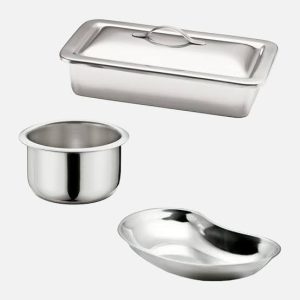Imagine yourself at a family meal when the aroma of exquisite food is permeating the room. You can’t help but notice that the food is placed on a gleaming silver plate when it is being served.
But since the idea of Silver not being suitable for particular types of food has been growing, it’s safe if you think about the compatibility of silver and non-veg foods.
Well, truth be told, there has long been dilemma on this subject; some individuals think it is completely safe, while others insist that it is an absolute no-no. This article however, will summarize the whole thing.
Can we eat non veg in silver plate?
If you’re a meat-eater or someone who love other non veg food, you might be wondering whether it’s safe to consume non-veg food on silver plates. After all, silver is a precious metal and it’s not exactly the most common material for dinnerware. So, what’s the deal?
The good news is that there is no real proof that eating meat on silverware poses a health risk.
In reality, silver possesses antibacterial qualities that can aid in the prevention of bacteria and other dangerous microbes, potentially lowering the risk of foodborne infections.
In fact, that’s the reason they’re used in medicine and the treatment of wounds.

But then, it’s important you understand that silver’s antibacterial abilities are not 100% reliable. They also have their limits.
Aside from that, utilizing silver plates by itself does not ensure the safety of your food. To lessen the danger of foodborne illnesses, it’s still vital to adopt safe cooking and hygiene techniques, such as properly washing your hands and cooking utensils and cooking your meat to the proper temperature.
Also, some people worry that certain foods, especially those that are acidic or have a lot of salt, may cause silver to react.
While this could be true, modern silverware and plates, on the other hand, are normally covered with a layer of protective substance to avoid tarnishing and guarantee that the silver does not come into direct contact with the food, so this is typically not a thing to worry.
So, unless you make use of worn silvers, you should have no problem.
Are There Any Benefits to Eating with Silver Plates?
We’ve been kinda talking about the disadvantages of silver all this while. But is there an advantage? Or is the hype of silver just about the cost?
Well, as we said earlier, one of the advantages is their antibacterial qualities.
Since it can destroy bacteria and other hazardous pathogens, silver has been utilized for millennia in medical and wound care.
In fact, according to some research, using silver utensils or plates may help lower the risk of foodborne diseases and stop bacteria from growing on the plate itself.
Silver plates can also be a fantastic way to improve your eating experience in addition to having antibacterial qualities. The reflecting nature of silver can enhance the aesthetics of your food and lend a sense of elegance to your supper.
Also, if you are holding a dinner party or other special occasion, they could wow your visitors and give them the impression that they are dining at a high-end restaurant.
However, these are only advantages when you care about these things.
Silver plates may also be more environmentally friendly than disposable ones. They are a long-lasting choice that can be used consistently, even if they can initially be more expensive. This eliminates the need for disposable plates, which increase waste and pollution.
Of course, it’s significant to remember that not everyone needs silver plates. They can be extremely pricey, and to maintain them in good shape, they need specific maintenance. However, some people can choose throwaway plates’ ease of use or just be uninterested in the beauty of silver plates.
In essence, Eating from silverware may not be necessary for everyone, but there may be advantages to take into account.
Alternatives to Silver Plates
Silver plates can be an excellent way to add sophistication and beauty to your dining experience, but they can also be rather expensive and need good maintenance to stay in good shape. Hence, here are some alternatives to take into account if you’re searching for a more cost-effective or low-maintenance option:
- Ceramic Plates: Ceramic plates are available in a wide range of hues and patterns and may be a wonderful way to give your dining table some character and style. They are dishwasher-safe for simple cleaning and typically less expensive than silver plates.
- Glass: Glass dinnerware is both reasonably priced and may give your dining table a contemporary, minimalist feel. Despite the fact that they can be more fragile than other materials, they’re typically simple to clean and can be a wonderful way to highlight the flavors and textures of your cuisine.
- Stainless Steel: Stainless steel plates might be a more reasonable alternative to silver if you like the way it looks but don’t want to spend the money on the real thing. These can give your dining experience a similar polish and elegance and are strong and dishwasher-safe.
- Bamboo: Bamboo plates might be a fantastic option for a more environmentally friendly option. In comparison to throwaway plates, they are more environmentally friendly because they are compostable and biodegradable. They come in a range of styles and designs and are also fairly inexpensive.
Conclusion
The important thing is to make your eating experience delightful and memorable, whether you decide to use silver plates or something else.
While silverware can add a sense of richness and elegance, it’s not the only method to create a formal dinner setting. But then, whatever you decide, keep in mind that enjoying your meal, taking in the company of those around you, and making the most of your dining experience are the most crucial things.




